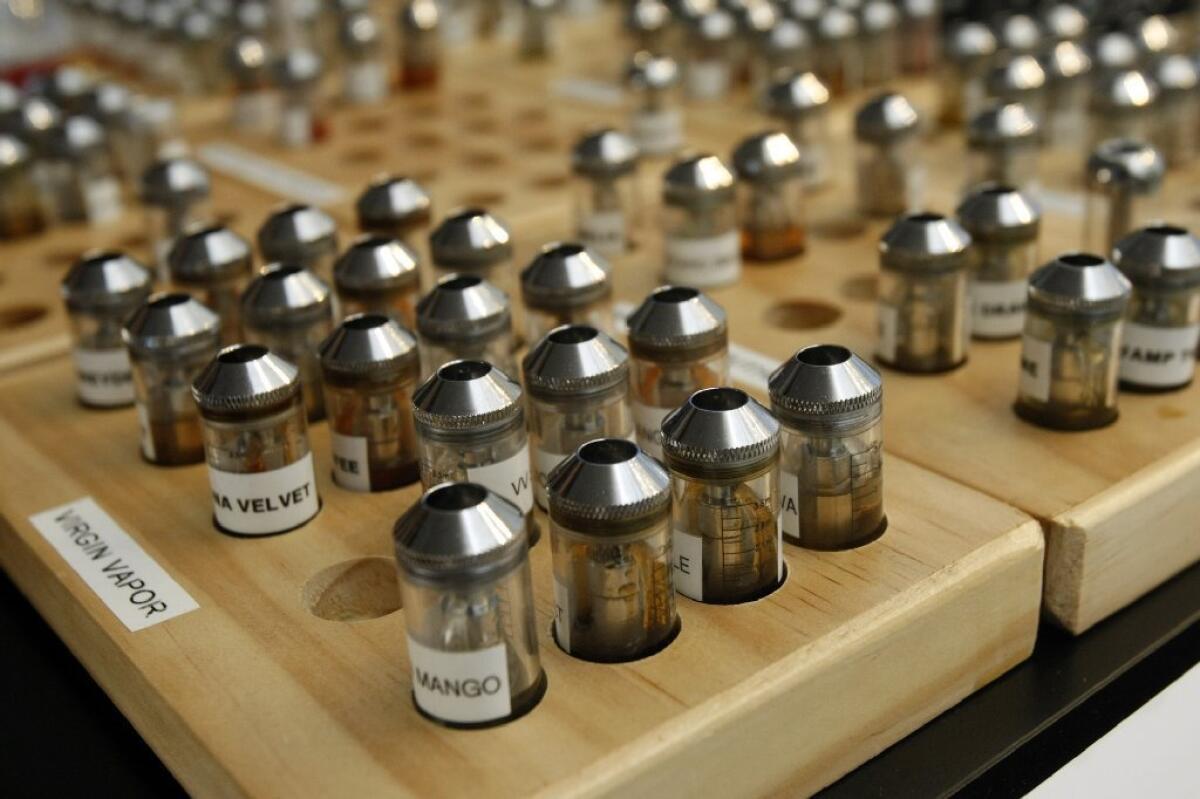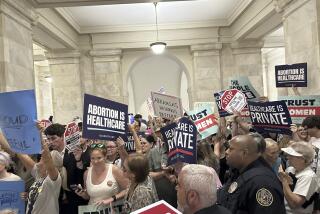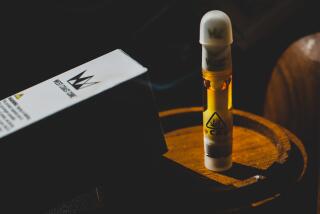Campaign to overturn California’s flavored tobacco sales ban accused of misleading voters

- Share via
SACRAMENTO — Supporters of a coming ban on the sale of flavored tobacco products in California asked the state attorney general on Tuesday to investigate complaints that people gathering signatures for a referendum to overturn the law have misrepresented the effort.
An attorney for the group Tobacco Free Kids Action Fund filed a complaint with state Atty. Gen. Xavier Becerra asking for an investigation of “numerous instances of illegal signature-gathering tactics,” noting that it is a misdemeanor for signature gatherers to intentionally misrepresent a referendum petition.
“In several instances, petition circulators for this referendum have approached voters and asked them to sign this petition under the pretense that signing the petition would support banning flavored tobacco,” attorney Lance Olson wrote. “This is categorically false, as this referendum seeks to overturn the law prohibiting the sale of flavored tobacco products.”
The American Heart Assn. also signed on to the complaint.
The new law, which bans the retail sale of flavored tobacco products including menthol and fruit flavors, as well as those used in electronic cigarettes, was approved by the state Legislature and governor in August and is set to take effect on Jan. 1.
If the referendum by the tobacco industry qualifies with 623,312 valid signatures submitted by Nov. 26, implementation of the law banning the retail sale of flavored tobacco would be delayed until voters act in the November 2022 election.
Beth Miller, a spokeswoman for the tobacco industry’s California Coalition for Fairness, the group behind the referendum, said the coalition has provided the public with an accurate assessment of the new law with a website.
“We have not heard any such complaint, other than the distortions from opponents who conveniently fail to mention that their so-called flavor ban exempts expensive flavored cigars for the wealthy and reduces funding for healthcare and education,” Miller said.
The written request for an investigation, which was also sent to Secretary of State Alex Padilla, included a video of a signature gatherer in front of a grocery store in Encinitas standing behind a table with a sign that read, “Ban Vape Flavors.”
A woman recording the man with a smartphone accuses him of misleading the public.
“Flavored vapes [sales] have been banned,” she adds. “You are trying to bring them back.”
The unidentified man, referring to the store, responds: “You can walk in there and see the flavors right now.”
Six other residents told the anti-tobacco group that they also felt misled by signature gatherers, including one who allegedly approached Brian Unruh in front of a Sacramento Walmart and asked, “Will you sign this petition to help ban the sale of flavored tobacco to children?”
Unruh said his wife was involved in the effort to pass Senate Bill 793, which banned the sale of flavored tobacco.
“I knew the bill passed so when I heard that [request], I was surprised,” Unruh said.
The coalition behind the referendum drive has received $15 million from tobacco companies such as Philip Morris USA and its affiliated U.S. Smokeless Tobacco Co., as well as R.J. Reynolds Tobacco Co.
Despite the large amount of money being spent on the referendum, tobacco companies would still come out ahead financially if the measure qualifies and delays the new law. Supporters of the new law estimate the tobacco industry will generate $1.1 billion in revenue from the sale of menthol cigarettes during the 22 months that California’s law would be delayed.
“Big Tobacco is trying everything they can to stop SB 793 from going into effect, and now that includes lying to California voters,” said Matthew L. Myers, president of the Campaign for Tobacco-Free Kids. “Big Tobacco knows that California voters won’t sign their referendum if they understand what it does, so they’re obfuscating the truth yet again to protect tens of millions of dollars in monthly revenue from candy flavors.”
This is not the first time supporters of the tobacco ban have cried foul about representations made by the tobacco industry.
During the debate over the legislation, supporters criticized a blitz of television and social media ads by the tobacco industry that said the legislation was “giving special treatment to the rich, and singling out communities of color” by banning menthol products.
The tobacco companies also filed a federal lawsuit against the state on Oct. 9 that seeks an injunction to block the new law, arguing it is “an overbroad reaction to legitimate public-health concerns about youth use of tobacco products.”
Tobacco giant Altria, the parent company of Philip Morris USA, said in a statement that it wants to “protect the opportunity to make products available to adult smokers that may reduce the harm of smoking and preserve the ability to make tobacco harm reduction a reality. This law hinders that ability.”
More to Read
Sign up for Essential California
The most important California stories and recommendations in your inbox every morning.
You may occasionally receive promotional content from the Los Angeles Times.











